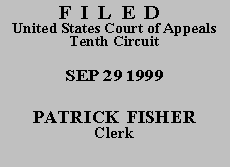

| UNITED STATES OF AMERICA,
Plaintiff-Appellee, |
|
| v. | |
| STANLEY LINFORD SMITH,
Defendant-Appellant. |
|
Stanley Linford Smith appeals his conviction of assault on a federal law enforcement officer, 18 U.S.C. § 111. We affirm.
Smith's only issue on appeal is whether the district court erred in finding Ronald Teel, Chief of Police for the Osage Nation Police Department, was a federal officer under 18 U.S.C. § 111. For purposes of § 111, a federal officer is "any officer . . . of the United States or of any agency in any branch of the United States Government." 18 U.S.C. § 1114. Whether Teel was a federal officer is a question of law we review de novo. See United States v. Martin, 163 F.3d 1212, 1214 (10th Cir. 1998), cert. denied, 119 S. Ct. 1791 (1999). Smith contends Teel was acting solely as an officer of the Osage Nation Police Department and not as a federal officer. Smith argues any assault on Teel while he was performing a tribal function (arresting Smith for disorderly conduct) should be prosecuted in tribal court, not federal court.
When Smith assaulted him, Teel was enforcing federal law on tribal lands, as authorized by a contract between the Bureau of Indian Affairs and the Osage tribe pursuant to 25 U.S.C. § 450h (638 contract) and 25 U.S.C. § 2804(a). Because Teel was acting under the authority granted in 25 U.S.C. § 2804(a), he was considered a federal officer for purposes of 18 U.S.C. § 111. See 25 U.S.C. § 2804(f) ("While acting under authority granted by the Secretary under subsection (a) of this section, a person who is not otherwise a Federal employee shall be considered to be--(1) an employee of the Department of the Interior only for purposes of . . . (B) sections 111 and 1114 of Title 18."). The district court did not err in finding Teel was a federal officer. See United States v. Young, 85 F.3d 334, 335 (8th Cir. 1996).
AFFIRMED.
Entered for the Court
Mary Beck Briscoe
Circuit Judge
*.This order and judgment is not binding precedent, except under the doctrines of law of the case, res judicata, and collateral estoppel. The court generally disfavors the citation of orders and judgments; nevertheless, an order and judgment may be cited under the terms and conditions of 10th Cir. R. 36.3.